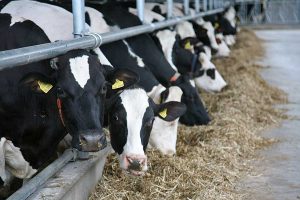News 022
News

European Milk Board / 20 January 2021
Cost coverage is the foundation of sustainable farming
Press release / (Berlin/D) What should the landscapes we live in, work on and enjoy look like in the future? How do we want to take care of the environment collectively, as a society?
As EU citizens, we wish for healthy natural spaces rich in diversity, both in terms of flora and fauna. Hedges, field margins and scattered trees near and in fields and meadows provide shelter and food for livestock and wild animals. They improve the (micro) climate and invite us to relax and unwind. Appropriate fertilizer use and humus formation lead to healthy land that is more productive and, at the same, more robust in the face of extreme weather conditions. It can then be used to grow high-quality food in a respectful way, using locally available resources within the framework of a feasible circular agricultural economy. These products are then traded regionally and fairly.
As we all know, the current situation in many places does not exactly align with this vision of sustainability. In order to achieve viable sustainability, efforts and investments in all economic sectors are a must. These ambitious goals lead to additional costs in the agricultural sector as well. Costs that must be borne by society if we are to truly move toward greater sustainability. Are we ready to honestly quantify these costs and bear them collectively?
Farmers are already being forced to shoulder food production costs. The situation on farms is tense. “Recent studies show that there is a cost shortfall of more than twenty-five percent in both conventional and organic milk production,” identifies Sieta van Keimpema, President of the dairy farmers’ organisation European Milk Board (EMB) from the Netherlands, as the main challenge faced by the sector. Expressed clearly in figures, this meant for conventional milk production in 2018 an average hourly wage of € 4.02 for the farm manager and his family members working on the farm. In 2019, prices were so low that farmers could not generate any income at all from milk production. EMB Executive Committee member and dairy farmer in North Rhine-Westphalia Elmar Hannen further explains: “Our incomes are not only supressed by low prices, but quickly rising costs due to stricter requirements or climate change itself are a factor as well.” This situation leads van Keimpema to demand a basic prerequisite: “The first step to more sustainability is that the farmers’ cost of production should be entirely covered.”
How can we achieve cost coverage in order to strive toward more ambitious goals?
We are currently before an opportunity to work toward making cost-covering producer prices a reality, by using the reform of the Common Agricultural Policy (CAP) to create a fairer framework. The European Parliament has already provided a commendable push in this direction. Therefore, Hannen calls for the following first step in the ongoing trilogues between the Council of the European Union, the European Commission and the European Parliament, especially from the Member States: “Get behind the future-oriented position of the European Parliament with regards to the Common Market Organisation. Support the inclusion of effective crisis instruments like voluntary volume reduction.” The temporary reduction of milk production volumes during crises envisaged therein would help avoid very severe crises and harmful overproduction. Recently, groups like animal welfare activists as well pointed out that existing fundamental shortcomings like poor prices must be dealt with before farmers are asked to take further steps to improve sustainability. Unfortunately, producers are currently not provided sufficient financial compensation, neither for their work nor for the efforts they are already undertaking in terms of environmental protection, animal welfare and climate change mitigation.
How can the Green Deal succeed in achieving sustainability?
In order to move closer to the desired vision of sustainability, all sectors need to take significantly more ambitious steps than they have to date. The corresponding guiding principles are already outlined in policy documents like the European Green Deal and its Farm to Fork Strategy, which set out higher ambitions. However, these policies must demonstrate how the necessary investments can be funded and must undertake a prior, careful analysis of the real effects at EU level as well as globally. Furthermore, sustainability strategies should be drawn up with the involvement of those who will, at the end of the day, do the work to implement them. “If costs for additional requirements are covered, we are, of course, willing to do more in terms of sustainability, which is already a concern for us by nature, due to our profession,” says EMB Vice-President Kjartan Poulsen from Denmark. He recommends financial incentives as a way to successfully make progress on sustainability. He goes on to say: “We farmers, who are in the thick of it day in and day out on our farms, see that in order to achieve fair prices, the market position of farmers must be effectively strengthened.” He also calls for strong commitment at a geostrategic level to regional and high-quality production without loopholes in free trade agreements. This also involves instruments like the Market Responsibility Programme that can react effectively to unexpected geostrategic developments and thus avoid sustainability losses.
These preconditions would make it possible for farmers to play their part in achieving this vision of viable sustainability that is worth striving for. It would also provide certainty for future generations wishing to take over farms – something that is absolutely essential if environmental sustainability is to become a long-term reality.
further information: European Milck Board (EMB), www.europeanmilkboard.org